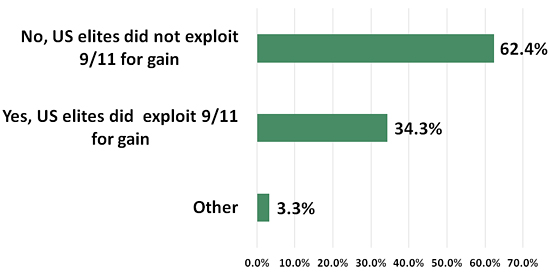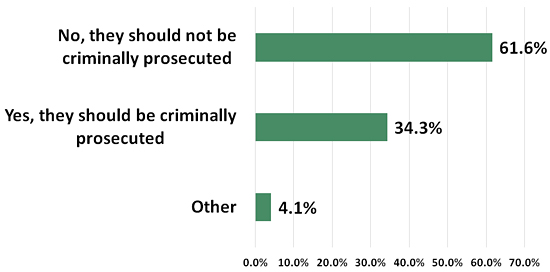A single common theme emerges from most public discussions of U.S. foreign policy. No matter how widespread the carnage, devastating the financial impact or enormous the opportunity cost of war – the United States is always presumed to have meant well. US foreign policies are designed as much to improve the well-being of foreigners as to protect US national security. It is relatively rare for revisionist historians or informed critics questioning the true motives behind US foreign policy to be allowed any significant platform to air contrarian views. Despite this pervasive discrimination, a significant segment of the American public not only believes US elites exploited the 9/11 attacks, but would like to see US government officials who backed the "Global War on Terror" criminally prosecuted.
Credible "Global War on Terror" damage assessments are as scarce as policy contrarians. Since 9/11, US government officials debated but generally shied away from releasing official body counts. This is to avoid public perceptions that the US is now trapped in a "quagmire" reminiscent of Vietnam. Credible, official total financial cost estimates of the series of conflicts – officially premised on the idea that they will protect the US from future 9/11-style attacks – are similarly difficult to come by. When there are no solid numbers, it becomes impossible to have meaningful debates or perform public opinion research – which may be why the information deficits persist.
Not all researchers are daunted, and some continue to bridge the knowledge gap. Brown University’s Cost of War Project released a November 14 estimate that half a million have died and that the spent and obligated cost of post-9/11 US wars through fiscal year 2019 is $5.9 trillion. This financial cost is comparable to the 2020 forecast GDP of Japan. The average US taxpayer has been tapped for $23,286 for the wars since 2001, according to Brown’s 2017 update.
How do most Americans feel about this immense diversion of wealth and carnage? When asked, "Brown University says the ‘global war on terror’ caused 480,000 deaths, uprooted 21 million & cost more than $6 trillion. Did US elites improperly exploit 9/11 for gain?" a surprisingly high percentage – roughly a third – of Americans replied that "Yes, elites did exploit 9/11 for gain."
Question #1: Brown University says the "global war on terror" caused 480,000 deaths, uprooted 21 million and cost more than $6 trillion. Did US elites improperly exploit 9/11 for gain?

Source: 11/26-11/28 IRmep poll of 1,000 US adults through Google Surveys. RMSE 6.1%. Raw data and demographic filters are available at Google.
The turmoil of the Global War on Terror has obviously been of immense benefit to US arms manufacturers and related industries, providing them with claims upon resources peacetime could not. It has spawned entirely new "homeland" security industries exploiting the fearful mindset that spending on ever more invasive monitoring, surveillance and alleged countermeasures should be the default resource prioritization.
The Israel lobby believes it can spin 9/11 into ever more unconditional claims on US taxpayers, including at the state level and US executive branch backing of its land seizures, occupations, and even knee-jerk US involvement in military attacks launched by Israel.
Question #2: Brown University says the "global war on terror" caused 480,000 deaths, uprooted 21 million and cost more than $6 trillion. Should the US leaders that backed it be prosecuted?

Source: 11/23-11/25 IRmep poll of 1,000 US adults through Google Surveys. RMSE 4.8%. Raw data and demographic filters are available at Google.
But roughly a third of Americans believe ‘Global War on Terror’ turmoil is manufactured and now want to criminally prosecute government officials who – oftentimes on the basis of enormous, now indisputable lies – plunged America into perpetual war. When asked, "Brown University says the ‘global war on terror’ caused 480,000 deaths, uprooted 21 million & cost more than $6 trillion. Should the US leaders that backed it be prosecuted?" 34.3% responded "yes, they should be criminally prosecuted" in yet another statistically relevant poll of American adults.
Grant F. Smith is research director of the Institute for Research: Middle Eastern Policy and the plaintiff in civil action no. 15-CV-01431 seeking CIA intelligence budget line items supporting Israel from 1990 through 2015. He is the author of the 2016 book, Big Israel: How Israel’s Lobby Moves America now available as an audiobook.


